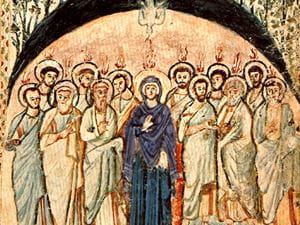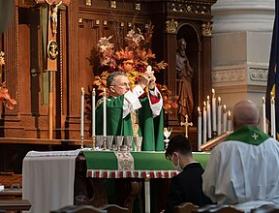
To speak in tongues is, most commonly, a form of Christian prayer in which the petitioner uses no known language to address God. It is also called glossolalia. Those who practice this believe that their words are a heavenly language given by God.
The practice is derived from the experience of the earliest Christians fifty days after Jesus’ resurrection. The occasion was a Jewish holiday called Shavuot, also called the Feast of Weeks or Pentecost, which is celebrated on the sixth day of Sivan, the third month of the Hebrew calendar. The story is told in Acts 2 of the Jews gathered in Jerusalem for this celebration when the Holy Spirit descended with a great wind and tongues of fire that anointed Jesus’ followers. These followers then proceeded to teach and preach in a wide variety of languages native to the many visitors to the city. Since these languages were known rather than heavenly, some consider this a different experience from what is practiced today.
Nevertheless, the apostle Paul addressed the practice, calling it a spiritual gift in 1 Corinthians 14. He diminished its importance, relative to the gift of prophecy, because the one who spoke in tongues was speaking to God and no one could understand the pray-er, “who uttered mysteries.” As the practice grew, so did the role of interpreting the prayers said in tongues. The interpretation of tongues became a spiritual gift as well.
The practice waned, however, in the centuries after the early church. It was revived in the early 20th century by the teachings and experiences of Charles Parham and William Seymour, both pastors and leaders. William Seymour was leading a church in Los Angeles, California, and his preaching and teaching on the Holy Spirit led to a years-long revival, referred to today as the Azusa Street Revival. While revivals have long been a part of the Protestant culture, the Azusa Street Revival was unusual in part because its multi-racial aspect. Both blacks and whites together experienced a spiritual renewal that included speaking in tongues. This ignited the globally known Pentecostal movement, which numbers nearly 300 million today. While Pentecostalism is an umbrella term that includes many different denominations, each with unique traditions and practices, most Pentecostals believe that speaking in tongues is a normal sign of the baptism of the Holy Spirit, which is a necessary post-conversion experience. They base their beliefs on the experiences of the early church as described in Acts, where new believers consistently spoke in tongues (Acts 10.44-46, 19.6).
In the 1960s, some Pentecostal beliefs and practices began to spread through non-Pentecostal denominations. Roman Catholics, Episcopalians, and other mainline churches began exploring the spiritual gifts, particularly speaking in tongues, healing, and prophecies. This wave of spiritual renewal, focused on baptism in the Holy Spirit, is called the charismatic renewal and continues to impact Christianity across the spectrum. Studies estimate that nearly 27 percent of all Christians today are either Pentecostal or charismatic.
3/23/2021 6:32:39 PM










